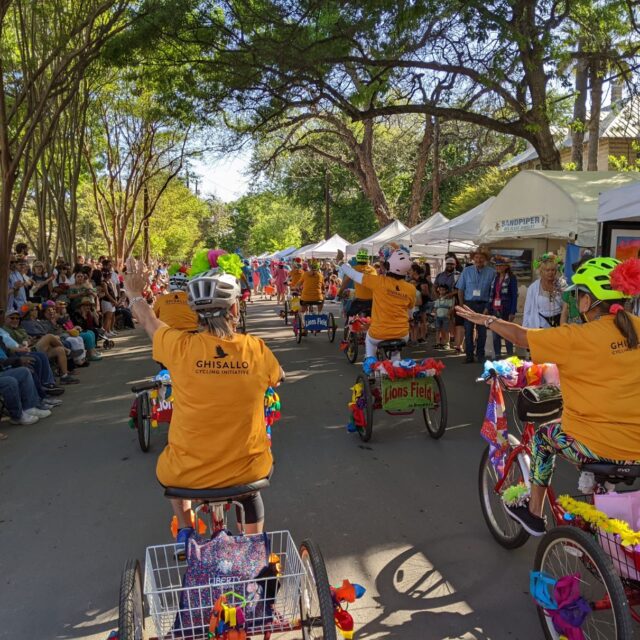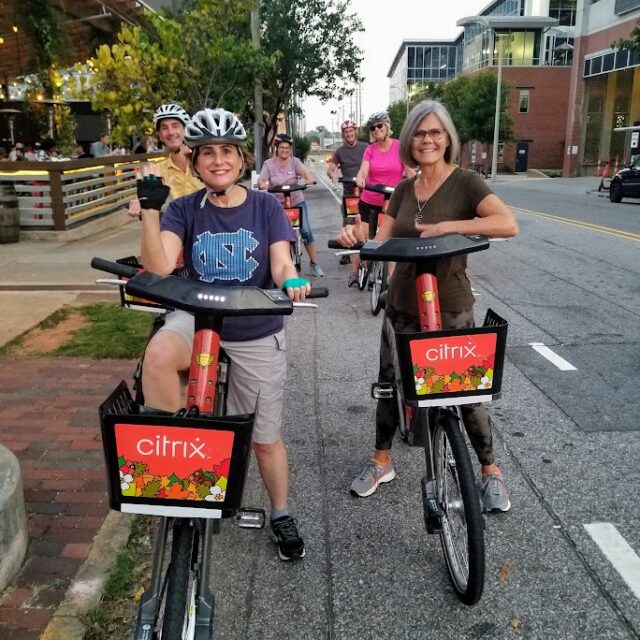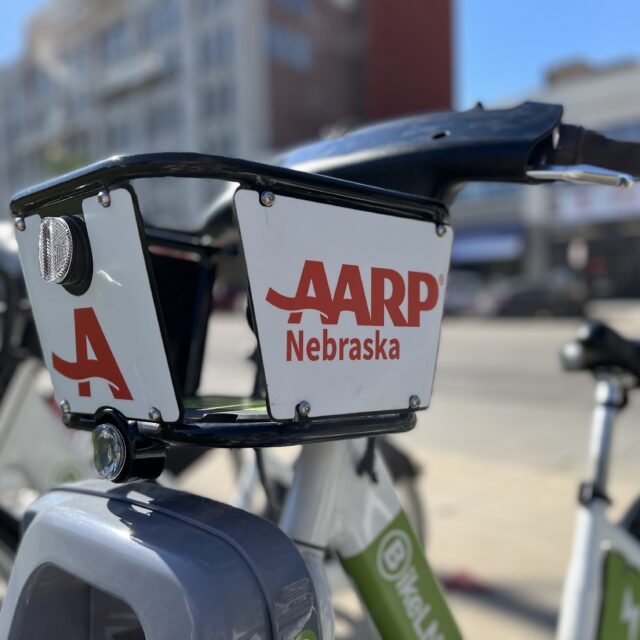An E-Bike Training Program for Older Adults
by Kiran Herbert, Communications Manager
August 11, 2023
Now in its second year, the Golden Rollers program in San Antonio, Texas, is making bike share accessible to those aged 50 years and older.
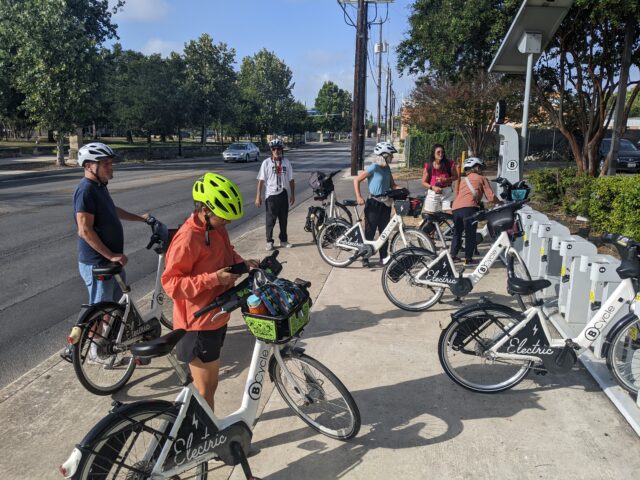
Founded in 2011, the nonprofit Ghisallo Cycling Initiative works to increase access to bicycling for underrepresented groups in Austin and San Antonio, Texas. As part of that mission, it created the Golden Rollers program to provide engaging bicycle-based recreation, exploration, and supportive services for adults aged 50 and older. The program aims to increase people’s quality of life through physical activity, help folks develop social connections, and raise the visibility of older adults and seniors in the public right-of-way.
While Austin’s program is more established, operating at some half a dozen different sites throughout the city, the San Antonio iteration has been steadily growing since it first launched in 2019. In both cities, the program is largely run out of senior centers and includes regular group rides on tricycles. Last year, the team in San Antonio decided to diversify its program by incorporating bike share and was able to do so thanks to a BBSP grant. This year, we’ve awarded the program another round of grant funding to iterate on lessons learned and expand its offerings.
When it comes to who’s using shared micromobility, older adults continue to be sorely under-represented. According to NABSA’s 2021 State of the Industry Report, adults aged 45 or older are 11-14% less likely to be using bike and scooter share than other age groups. It’s a problem that’s not just limited to shared micromobility either: A 2020 study found that adults 60 years old and up remain underrepresented in all geographies, although they do have relatively better representation where levels of bicycling are high (Texas, unfortunately, is no such place).
It’s important that we make an effort to figure out ways to engage this age group and get them bicycling. Over the next few decades, as baby boomers continue to age, the proportion of Americans age 65 and older will grow from 15% to 24% of the overall population. Targeted bike share programming for older adults has the potential to give people opportunities for socialization, exercise, and transportation, which are all key to helping people age well and in place.
The Golden Rollers program in San Antonio seeks to engage this underrepresented population by providing e-bike-specific training, annual bike share memberships, guided rides, and safety equipment to seniors and older adults at no cost. This year, 36 participants will complete a three-session, six-hour program designed to increase ridership by building confidence and establishing social connections with other riders. The program, based at the Commnader’s House, a senior center close to a BCycle bike share station, takes advantage of the all-electric system to safely explore trails and neighborhood streets on destination-based rides.
There are a number of ways the Ghisallo team tweaked this year’s program in order to ensure it better served its target demographic. First, they decided to no longer sign people up for passes ahead of actually getting them to ride a bike share bike.
“What we found out last year was that people would be interested in the program in theory and we’d sign people up early,” says Cristina Solorzano, a community educator with Ghisallo. “A lot of those participants didn’t get the best use out of the pass because they weren’t comfortable riding right off the bat or they didn’t have a partner to go riding with.”
This year, when the Ghisallo team held an informational session at the Commander’s House, they were explicit about the riding component and that the opportunity was ideal for people interested in using bike share year-round. They also tweaked the intake questionnaire to focus more on people’s past riding history and their comfort level riding a bike. During
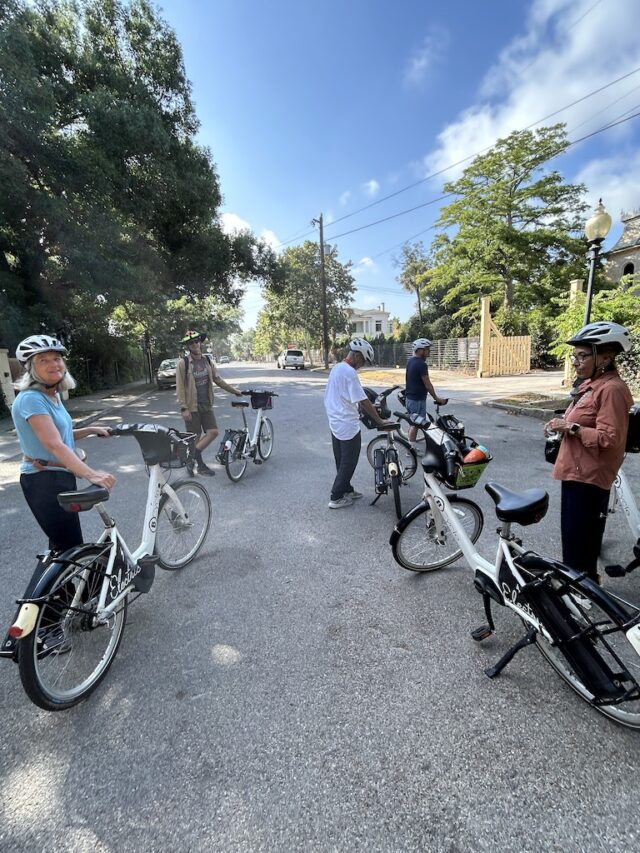 “At the outset, before people went further with the program, we made sure they were comfortable with the equipment and bike riding aspect of the program,” says Solorzano. “Some folks are willing to give it a try but then will ultimately decide it’s not for them. Because of that, we decided to overbook our program with the expectation that some people would drop out.”
“At the outset, before people went further with the program, we made sure they were comfortable with the equipment and bike riding aspect of the program,” says Solorzano. “Some folks are willing to give it a try but then will ultimately decide it’s not for them. Because of that, we decided to overbook our program with the expectation that some people would drop out.”
Other improvements included not just using QR codes to share information or sign folks up — for this population, paper fliers and sign-up sheets were preferred. The Ghisallo team also made the decision to teach the smartphone skills that are necessary to download the BCycle app, sign-up for a membership, and check out bikes (they also made sure users had a smartphone and credit card for overages ahead of time).
“ We’re one year better at teaching those tech skills,” says Carl Bradtmiller, Ghisallo’s San Antonio lead and community educator. “During our first session, we spend as long on the BCycle app and signing up as we do on the bike riding. It takes people some time to figure it out and get through the registration process.”
One of the goals of the sessions — which are broken down into smaller cohorts of 6-20 people and run twice a week for three weeks in June, July, and August — is to promote autonomy amongst participants. Not only do the groups get a crash course on navigating the technology that powers bike share, but they also learn about safe on-street riding, the different types of bicycle infrastructure, the rules of the road, and how to use an electric pedal-assist bike. Each cohort also participates in a group ride.
“From last year to this year, something that worked well was using the bike share system in the wild,” says Bradtmiller. “That means going out and actually checking out bikes, looking at what time it is when we start, learning how to dock — it helps people understand how bike share is meant to be used, and how they can avoid incurring additional costs.”
According to Bradtmiller, this program is particularly fun to lead because, for the most part, all of the participants are putting themselves out there, taking a chance on trying something new. Riding as a group can also help people build crucial social connections as they recreate. Crucially, the Commander’s House senior center is located near a two-way cycle path that runs parallel to the street and a separated sidewalk — it’s an ideal place to begin riding again.
“If not for this program, they might have thought their bike riding days were behind them,” says Bradtmiller, who hopes to keep track of these users and lead additional group rides throughout the year. “When that electric motor kicks on, sometimes that’s enough for people to gain confidence and have fun riding again.”
The Better Bike Share Partnership is funded by The JPB Foundation as a collaboration between the City of Philadelphia, the National Association of City Transportation Officials (NACTO), and the PeopleForBikes Foundation to build equitable and replicable bike share systems. Follow us on LinkedIn, Facebook, Twitter, and Instagram, or sign up for our weekly newsletter. Have a question or a story idea? Email kiran@peopleforbikes.org.

